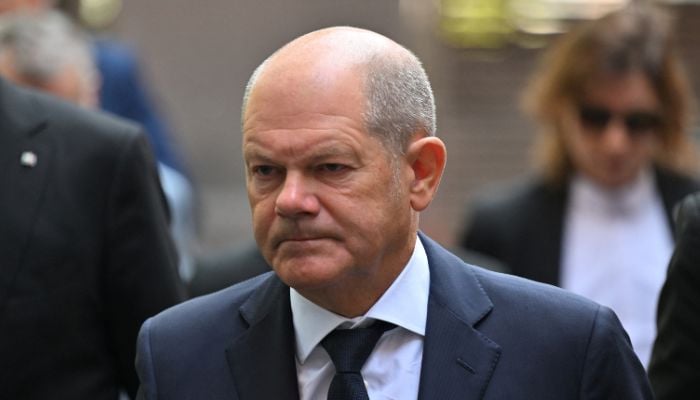
BERLIN: German Chancellor Olaf Scholz vowed to step up deportations on Monday during a visit to Solingen, where a deadly mass stabbing linked to Daesh has emboldened the far-right opposition and stoked criticism of his government’s handling of migration.
“We will have to do everything we can to ensure that those who cannot and are not allowed to stay in Germany are repatriated and deported,” Scholz told reporters in the western city, where he laid a flower at the scene of the crime.
“This was terrorism, terrorism against us all,” he added.
The attack, in which a 26-year-old suspected Daesh member from Syria is accused of killing three people, has fuelled political tensions over asylum and deportation rules ahead of three state elections next month.
The group claimed responsibility for the attack, which occurred on Friday evening during a festival celebrating Solingen’s 650-year history. Alongside the three killed, eight were injured, some seriously.
The far-right Alternative for Germany (AfD) party, which campaigns for a crackdown on migration, is leading in the polls in Saxony and Thuringia, where state elections are set for Sunday, and in Brandenburg, which has its election on September 22.
The AfD seized on the attack in its election campaign, with Thuringia’s leading candidate for the party, Bjoern Hoecke, pitching to voters the choice of “Hoecke or Solingen”.
Opinion pollsters Stefan Merz of Infratest dimap and Manfred Guellner of Forsa told Reuters the attack would be unlikely to translate into more votes for the far-right party because its supporters had already been mobilised by migration issues.
Infratest dimap’s Merz cited the possibility that the centre-right CDU could benefit at the expense of Scholz’s centre-left Social Democrats.
Botched deportation
The attack puts pressure on Scholz as his Social Democrats, alongside their Green and Free Democrat coalition partners, bruised from months of quarrelling, are trailing in the polls.
In a sign of tougher rhetoric, Scholz promised in October 2023 to ramp up deportations “big style” — a promise he repeated after his visit to the Solingen attack scene.
Again in June, Scholz said he would take a tougher stance on deportation after an Afghan man stabbed a police officer, who later died of his injuries, during an attack on a right-wing demonstration in the city of Mannheim.
Scholz said on Monday deportations had increased by some two thirds compared to 2021 levels. “But that is no reason for us to sit back and relax,” he added, saying the government was looking at legal and practical ways to boost the numbers.
Authorities had planned to deport the suspect in Friday’s attack to Bulgaria last year under European Union asylum rules, according to German media. The deportation was unsuccessful because the man had not been at his refugee accommodation when authorities tried to carry out the measure, the reports said.
A government spokesperson said the deportation plan had “failed in practice” rather than on any legal basis.



